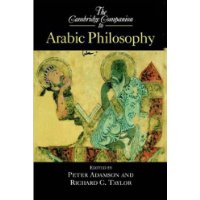
基本信息出版社:Cambridge University Press
页码:468 页
出版日期:2005年01月
ISBN:052152069X
条形码:9780521520690
装帧:平装
丛书名:Cambridge Companions to Philosophy
外文书名:剑桥哲学指南: 阿拉伯哲学
内容简介 This collection of essays by leading scholars provides an introduction to Arabic philosophy by way of chapters devoted to individual thinkers (such as al-Farabi, Avicenna and Averroes) or groups, especially during the 'classical' period from the ninth to the twelfth centuries. It also includes chapters on areas of philosophical inquiry across the tradition, such as ethics and metaphysics. Finally, it includes chapters on later Islamic thought, and on the connections between Arabic philosophy and Greek, Jewish, and Latin philosophy.
作者简介 Peter Adamson is Lecturer in Philosophy at King’s College London.
编辑推荐 Review
'The Cambridge Companion to Arabic Philosophy was long overdue. The Arabic philosophical tradition has often been treated as marginal by Western scholars, but this work attests to its great riches. It has, however, remained much understudied, hence, the editors aim to 'invite' readers to the study of Arabic philosophy and to provide 'a basic grounding in some of the main figures and themes'. These are modest goals in comparison to what this excellent new Cambridge Companion achieves. ... The Cambridge Companion to Arabic Philosophy will not only be of interest to scholars and students of Arabic philosophy, but should also be of interest to students and scholars working more generally on later Greek philosophical traditions and on philosophy in the Middle Ages. The work should remain a very good reference for a number of years to come.' Bryn Mawr Classical Review 'By any reckoning this is a remarkable book.' Reference Reviews '... a rich and up-to-date assessment of the varied philosophy written in Arabic - including Christian and Jewish as well as Muslim thinkers ...' The Heythrop Journal
Review
‘The Cambridge Companion to Arabic Philosophy was long overdue. The Arabic philosophical tradition has often been treated as marginal by Western scholars, but this work attests to its great riches. It has, however, remained much understudied, hence, the editors aim to ‘invite‘ readers to the study of Arabic philosophy and to provide ‘a basic grounding in some of the main figures and themes‘. These are modest goals in comparison to what this excellent new Cambridge Companion achieves. … The Cambridge Companion to Arabic Philosophy will not only be of interest to scholars and students of Arabic philosophy, but should also be of interest to students and scholars working more generally on later Greek philosophical traditions and on philosophy in the Middle Ages. The work should remain a very good reference for a number of years to come.‘ Bryn Mawr Classical Review
'By any reckoning this is a remarkable book.' Reference Reviews
'… a rich and up-to-date assessment of the varied philosophy written in Arabic - including Christian and Jewish as well as Muslim thinkers …' The Heythrop Journal
Product Description
Philosophy written in Arabic and in the Islamic world represents one of the great traditions of Western philosophy. Inspired by Greek philosophical works and the indigenous ideas of Islamic theology, Arabic philosophers from the ninth century onwards put forward ideas of great philosophical and historical importance. This collection of essays, by some of the leading scholars in Arabic philosophy, provides an introduction to the field by way of chapters devoted to individual thinkers (such as al-Farabi, Avicenna and Averroes) or groups, especially during the ‘classical’ period from the ninth to the twelfth centuries. It also includes chapters on areas of philosophical inquiry across the tradition, such as ethics and metaphysics. Finally, it includes chapters on later Islamic thought, and on the connections between Arabic philosophy and Greek, Jewish, and Latin philosophy. The volume also includes a useful bibliography and a chronology of the most important Arabic thinkers.